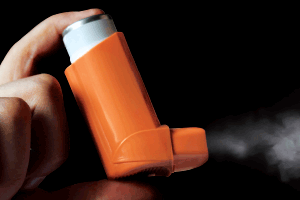Gasping for Breath
| October 16, 2013 “My twin daughters were preemies which brings with it a higher risk for asthma ” Rivkie relates. “One grew out of it but the other Blima did not. I remember many scary moments rushing Blima to the doctor wondering if we needed to head to the emergency room. As a baby she couldn’t tell me when she was in trouble. My husband a light sleeper would get up all night long to check on her. It was impossible not to worry.
“My twin daughters were preemies which brings with it a higher risk for asthma ” Rivkie relates. “One grew out of it but the other Blima did not. I remember many scary moments rushing Blima to the doctor wondering if we needed to head to the emergency room. As a baby she couldn’t tell me when she was in trouble. My husband a light sleeper would get up all night long to check on her. It was impossible not to worry.
“I remember many hours sitting with her while albuterol was given by mouth and in her nebulizer [a machine that delivers medication in a mist so it can be inhaled into the lungs] reading to her and helping her pass the time. In the winter my husband would wrap her in a blanket and sit outside with her because the cold crisp air helped her breathe.
“Now 11 Blima is on preventive treatment Flovent twice a day and she uses a nasal spray. Sometimes especially during cold and flu season she even finds the steps at school hard to manage — she can use the elevator but she doesn’t want to be different. I have a hard time convincing her to see the nurse. When she gets a slight cold she has to be home with a bronchodilator for several days. I’m the principal of a school and my students know that when my daughter comes to school with me it’s because she’s wheezing and I can’t leave her alone.”
Doctors’ Report:
“Asthma is a chronic medical condition characterized by increased sensitivity of the lungs” explains Dr. Arthur Atlas director of theRespiratoryCenterfor Children at Goryeb Children’s Hospital inNew Jersey. Of the 24 million people with asthma in theUnited States 7 million are children.
“When we breathe normal lungs have tubes that carry air through the lungs to the air sacs where the oxygen enters the blood and carbon dioxide is then blown off when we exhale. These tubes or airways are surrounded by muscles that allow them to dilate and constrict. For asthmatics dilation and constriction are exaggerated. Their airways constrict more than they should when exposed to triggers which causes coughing wheezing and shortness of breath and can dilate more than they should in the relaxation phase.”
To read the rest of this story please buy this issue of Mishpacha or sign up for a weekly subscription.
Oops! We could not locate your form.
